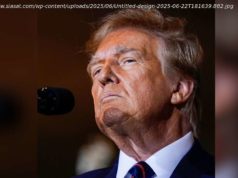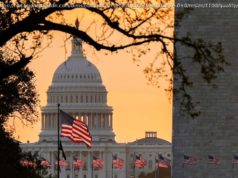U. S. Ambassador Nikki Haley has told the United Nations that North Korea’s missile launch « brings us closer » to a war that the United States doesn’t want.
The Latest on global response to North Korea’s latest missile launch (all times local):
8 a.m. Thursday
U. S. Ambassador Nikki Haley says North Korea’s ballistic missile launch « brings us closer to war » that the U. S. doesn’t seek.
She told an emergency meeting of the U. N. Security Council on Wednesday that if war comes as a result of further acts of « aggression » like the latest launch « make no mistake the North Korean regime will be utterly destroyed. »
Haley says the Trump administration warned North Korea that its future is in the hands of its leaders and the choice was theirs.
With Tuesday’s launch, she said, Kim Jong Un’s regime made a choice — « and with this choice comes a critical choice for the rest of the world. »
She called on all countries to cut all ties to North Korea.
___
6:10 a.m.
President Donald Trump can’t resist taking a dig at North Korean leader Kim Jong Un, even when selling tax reform.
After calling the Republican tax plan « rocket fuel » for the American economy, Trump digressed with an aside on « Little Rocket Man, » calling Kim « a sick puppy. »
Trump drew hoots from the crowd during a tax reform speech in St. Charles, Missouri, with the impromptu shot at Kim a day after the North launched its most powerful missile yet.
Earlier Wednesday, Trump threatened additional sanctions against the North over its continued nuclear missile development.
___
5:55 a.m.
France’s U. N. Ambassador Francois Delattre (fran-SWAH’ deh-LAH’-trah) says the North Korean threat has changed dramatically over a few months to being global and immediate and France wants tougher sanctions to maximize pressure on Kim Jong Un’s regime.
Delattre told reporters Wednesday ahead of an emergency Security Council meeting on North Korea’s latest ballistic missile test that the scope and scale of the North’s nuclear threat has moved from being regional and « potential. »
He says, « Weakness or ambiguity are simply not an option. »
Delattre says that’s why France is calling for intensified efforts to strictly implement existing sanctions and additional sanctions.
Delattre says, « Maximum firmness today is our best antidote to the risk of war and our best tool to promote a political solution. »
___
4:30 a.m.
Japan’s U. N. Ambassador Koro Bessho says the international community must « keep the pressure up so that North Koreans will understand that they need to change their course. »
Bessho spoke to reporters Wednesday ahead of an emergency meeting of the U. N. Security Council called by the United States, Japan and South Korea following North Korea’s launch of an intercontinental ballistic missile.
France’s U. N. Ambassador Francois Delattre said full implementation and tightening of sanctions are « key priorities for France but also for others. »
Tightening sanctions would require a new Security Council resolution.
Sweden’s deputy U. N. ambassador Carl Skau reiterated his country’s strong condemnation of the launch and said « it’s important that the council speaks with one voice on this issue. »
___
12:30 a.m.
U. S. Secretary of State Rex Tillerson says the United States may target additional financial institutions with sanctions following North Korea’s latest intercontinental missile launch.
Tillerson spoke in Washington on Wednesday during a meeting with the visiting crown prince of Bahrain. He said the U. S. has a « long list of additional potential sanctions. »
Tillerson didn’t specify what financial institutions could be hit with sanctions. But he said the United States will be announcing the sanctions once they’re « ready to roll out. » His comments came after President Donald Trump announced on Twitter that more sanctions were coming.
Tillerson said he’s not giving up on diplomatic efforts to resolve concerns about North Korea’s nuclear weapons program peacefully. He said « we keep working at it every day. »
North Korea said the missile it launched early Wednesday can carry a large nuclear warhead and has « significantly more » power than missiles it’s tested earlier.






